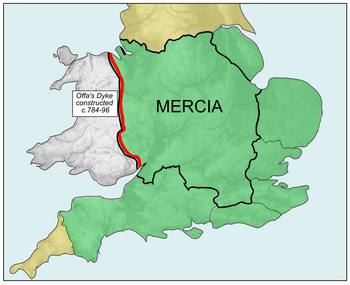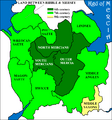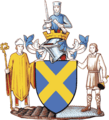Mercia facts for kids
Quick facts for kids
Kingdom of Mercia
|
|||||||||||||||
|---|---|---|---|---|---|---|---|---|---|---|---|---|---|---|---|
| 527–918 | |||||||||||||||

The Kingdom of Mercia (thick line) and the kingdom's extent
during the Mercian Supremacy (green shading) |
|||||||||||||||
| Status | Independent kingdom (527–879) Client state of Wessex (c. 879–918) |
||||||||||||||
| Capital | Tamworth | ||||||||||||||
| Common languages | Old English, Latin | ||||||||||||||
| Religion | Paganism, Christianity | ||||||||||||||
| Government | Absolute monarchy | ||||||||||||||
| Monarch | |||||||||||||||
|
• 527–?
|
Icel (first) | ||||||||||||||
|
• c. 626–655
|
Penda | ||||||||||||||
|
• 658-675
|
Wulfhere | ||||||||||||||
| Legislature | Witenagemot | ||||||||||||||
| Historical era | Heptarchy | ||||||||||||||
|
• Established
|
527 | ||||||||||||||
|
• Disestablished
|
918 | ||||||||||||||
| Currency | Sceat | ||||||||||||||
|
|||||||||||||||
| Today part of |
• West Midlands
• East Midlands • East of England • Greater London • Yorkshire & the Humber (N. Lincs. and NE Lincs.) • Northern parts of South East England (incl. Berks., Beds., Herts., Oxon. Surrey, and Bucks.) • North West England • Wales (Flintshire and Wrexham) |
||||||||||||||
Mercia was one of the kingdoms of the Anglo-Saxon Heptarchy. The name means "border people". Mercia dominated what would later become England for three centuries, going into a gradual decline while Wessex eventually conquered and united all the kingdoms into the Kingdom of England.
The kingdom was centred on the valley of the River Trent and its tributaries, in the region now known as the English Midlands. The court moved around the kingdom, and there was no fixed capital city.
For 300 years (between 600 and 900), having annexed or gained submissions from five of the other six kingdoms of the Heptarchy (East Anglia, Essex, Kent, Sussex and Wessex), Mercia dominated England south of the River Humber: this period is known as the Mercian Supremacy.
The reign of King Offa, who is best remembered for his Dyke that designated the boundary between Mercia and the Welsh kingdoms, is sometimes known as the "Golden Age of Mercia".
Mercia was a pagan kingdom; King Peada converted to Christianity around 656, and Christianity was firmly established in the kingdom by the late 7th century.
At the end of the 9th century, following the invasions of the Vikings and their Great Heathen Army, much of the former Mercian territory was absorbed into the Danelaw. At its height, the Danelaw included London, all of East Anglia and most of the North of England.
The final Mercian king, Ceolwulf II, died in 879
Mercia is still used as a geographic designation, and the name is used by a wide range of organisations, including military units, public, commercial and voluntary bodies.
Contents
Notable kings
Penda
Penda (c. 626–655), was a pagan king of Mercia. He was able to put together a of a number of smaller kingdoms and from that he created Mercia. But in the 630s he was not able to compete with the larger Anglo-Saxon kingdoms that were around his.
Northumberland was threatening to expand into the territory of Mercia. Penda found it convenient to ally with Gwynedd, the dominant British kingdom to the west. It was an unusual cooperation between Christians and pagans, but it worked. Together they defeated the Northumbrian king, Edwin, who died at the battle of Hatfield Chase.
Athelred I
Athelred I (675–716), was the third of Penda's sons to be king of Mercia. He ravaged Kent to prevent them from breaking away from his rule. In 679 he was at war with Northumbria. According to Bede, Theodore Archbishop of Canterbury between the two kings to restore peace. He married Ostryth, daughter of the king of Bernicia.
He was a Christian king who founded several churches and monasteries. He stepped down as king in 704 and passed the crown to his nephew Cenred. He was of the monastery of Bardsey and appears to have died about 716.
Offa
Offa(757–796), was the first of the Anglo-Saxon kings who might rightly be called "king of the English". He was the son of Thingfrith, the brother of Penda.
He struggled to gain control of Mercia having come to power just after a civil war. But he proved to be ruthless, bold and creative in bringing Kent, Sussex and Essex under his control. Offa had diplomatic relations with Charlemagne. He was one of the few Anglo-Saxon monarchs to have dealings with continental rulers. Letters and presents were exchanged. But when Offa sought a marriage of his son to one of Charlemagne's daughters, relations were quickly cut off. Frankish ports were closed to British ships.
Offa, very involved in church affairs, presided over church councils personally in 786-7. In 787 he convinced the pope to create the position of archbishop of Lichfield in Mercia. He wanted his own archbishop who was closer at hand than the Archbishop of Canterbury.
He reorganized the of his kingdom. One of these defenses, Offa's Dyke was a massive earthworks between Mercia and the Welsh kingdoms to the west.
Offa died in 796. His son, Ecgfrith, lasted only 141 days as king. Mercia was never again as powerful as it was during Offa's reign.
Viking invasions
A new Mercian king, Raedwulf, was killed by Viking raiders in 844. In 855 Viking bands were recorded as being in Mercia near Wrekin. But the year 865 saw a major change in activity by the Scandinavian invaders. This was a much larger military force than had been seen before. The arrival of the Great Heathen Army in East Anglia.
For a time the Danes (Vikings) were more interested in Northumbria. They gained control of York and moved south into Mercia then camped for the winter in Nottingham.
In the spring of 868 a combined Mercian and West Saxon army came against the Vikings, but there was no battle. The Mercian king Burghred made a peace treaty with the invaders, who then moved north to York.
In 873 Burghred was forced out of Mercia by the Vikings who then set their own choice of King, Ceowulf.
In 874 the heathen army split with Halfdan, one of the leaders taking his band north.
In 878 the Vikings in Mercia were attacked and defeated by King Alfred of Wessex. They converted to Christianity and settled on the land in East Anglia.
Decline as a kingdom
The ninth century saw the decline of Mercia as a kingdom.
In 873-74 Mercia was conquered by the heathen army.
In the 880s Wessex formed a marriage alliance with Mercia. Alfred's daughter, Ethelflaeda, married Ethelstan (II), of Mercia. When Ethelstan died, in 912, Edward the Elder appointed Ethelflaeda (his sister) 'Lady of the Mercians.' When Ethelflaeda died in 918, the Mercian nobles now thought themselves free of Wessex rule. Edward stepped in and appointed Ethelflaeda's daughter, Aelfwynn, to rule Mercia as his representative. But in 919 Edward brought her back to Wessex.
After that Mercia was considered just another shire under his rule. A series of (similar to a count in Europe) followed.
Under Canute in 1017, Mercia became one of the four divisions of England.
Images for kids
-
The Staffordshire Hoard, discovered in a field in Hammerwich, near Lichfield in July 2009, is perhaps the most important collection of Anglo-Saxon objects found in England
-
Arms of St Albans City Council
See also
 In Spanish: Reino de Mercia para niños
In Spanish: Reino de Mercia para niños




